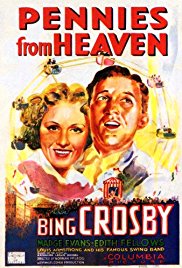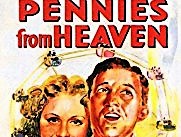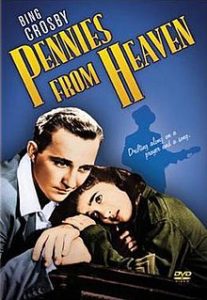Pennies from Heaven *** (1936, Bing Crosby, Edith Fellows, Madge Evans, Louis Armstrong, Donald Meek) – Classic Movie Review 6890
Bing Crosby stars as Larry Poole, a Thirties modern-day troubadour with ambitions to be a singing gondolier in Venice. But, after a short spell in jail on a trumped-up charge, he fulfills a promise to visit the family of a doomed inmate headed for the electric chair – and all their lives are turned around.
This most unlikely of stories – based on the novel The Peacock’s Feather by Katherine Leslie Moore – brings out an appealing performance from Crosby, and he is ably abetted by the 13-year-old Edith Fellows as a little tomboy called Patsy Smith, Madge Evans as the welfare lady Susan Sprague, and Donald Meek as Patsy’s grandpa, Gramp Smith. Louis Armstrong plays Henry.
The title song by Arthur Johnston (music) and Johnny Burke (lyrics) is an Oscar-nominated Best Original Song treat, though Louis Armstrong and Crosby’s rendering of their ‘Skeleton in my Closet’ isn’t far behind. ‘So Do I’ and ‘Let’s Call a Heart a Heart’ are other pleasures.
Also in the cast are Tom Dugan, John Gallaudet, Nana Bryant, Charles C Wilson, Harry Tyler, William Stack, Tom Ricketts, Lionel Hampton, Nydia Westman, Arthur Hoyt, George Chandler, Stanley Andrews and Stanley Blystone.
Pennies from Heaven is directed by Norman Z McLeod, runs 81 minutes, is produced by Emanuel Cohen Productions, is released by Columbia Pictures, is written by Katherine Leslie Moore, William Rankin and Jo Swerling, based on the novel The Peacock’s Feather by Katherine Leslie Moore, is shot in black and white by Robert Pittack, is produced by Emanuel Cohen, is scored by Louis Silvers, Howard Jackson and George E Stoll, with music by Arthur Johnston and Johnny Burke, and is designed by Stephen Goosson.
It is Crosby’s first independent production jointly with Emanuel Cohen’s Major Pictures and he had a share in the profits. Crosby recorded his solos for Decca Records and they were all chart hits, with ‘Pennies from Heaven’ a number one for ten weeks. Special billing was given to Armstrong at Crosby’s insistence, and he also insisted on Armstrong being hired for the movie.
The 1981 film Pennies from Heaven re-uses the film’s title and title song. The fake Depression-era optimism of the 1936 film is exactly what Dennis Potter is attacking in 1981.
© Derek Winnert 2018 Classic Movie Review 6890
Check out more reviews on http://derekwinnert.com




